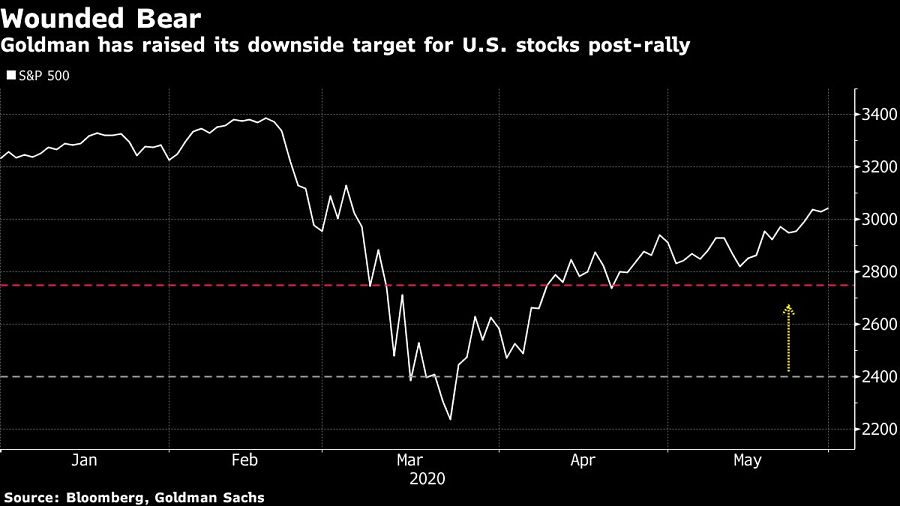

Goldman Sachs Group Inc. has effectively bowed to pressure from the continuing rally in U.S. stocks and abandoned its call for another steep sell-off.
Strategists led by David Kostin have rolled back their prediction that the S&P 500 would slump to the 2,400 level -- over 20% below Friday’s 3,044 close -- and now see downside risks capped at 2,750. The U.S. equity benchmark could even rally further to 3,200, they wrote in a note Friday.
“The powerful rebound means our previous three-month target of 2,400 is unlikely to be realized,” the strategists wrote. “Monetary and fiscal policy support limit likely downside to roughly 10%. Investor positioning has oscillated between neutral and low and is a possible 5% upside catalyst.”

The shift came just after JPMorgan Chase & Co.’s strategists shifted in the other direction -- reining in their bullish outlook. JPMorgan’s Marko Kolanovic warned about rising U.S.-China tensions in a note Thursday.
Goldman’s strategists maintained their year-end target of 3,000 for the benchmark U.S. stock gauge.
Goldman continues to argue that short-term returns are skewed to the downside -- “or neutral at best” -- thanks to the risk of an economic, earnings, trade or political “hiccup” to the normalization trend. A broader participation in the rally would be needed for the S&P 500 to move meaningfully higher.
The S&P 500 has climbed 36% from its March 23 low, helped by massive fiscal and monetary support, mega-cap outperformance and optimism about the economy restarting, according to Goldman. Last month it argued that fear of missing out was a key driver of the rebound in stocks.

The strategic merger of equals with the $27 billion RIA firm in Los Angeles marks what could be the largest unification of the summer 2025 M&A season.

Report highlights lack of options for those faced with emergency expenses.

However, Raymond James has had success recruiting Commonwealth advisors.

In a saturated market of PE secondaries and repackaged alts, cultural assets stand out as an underutilized, experiential, and increasingly monetizable class of wealth.

A complaint by the Social Security Administration's chief data officer alleges numbers, names, and other sensitive information were handled in a way that creates "enormous vulnerabilities."
Orion's Tom Wilson on delivering coordinated, high-touch service in a world where returns alone no longer set you apart.
Barely a decade old, registered index-linked annuities have quickly surged in popularity, thanks to their unique blend of protection and growth potential—an appealing option for investors looking to chart a steadier course through today's choppy market waters, says Myles Lambert, Brighthouse Financial.
